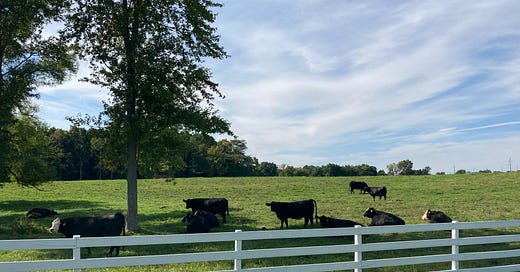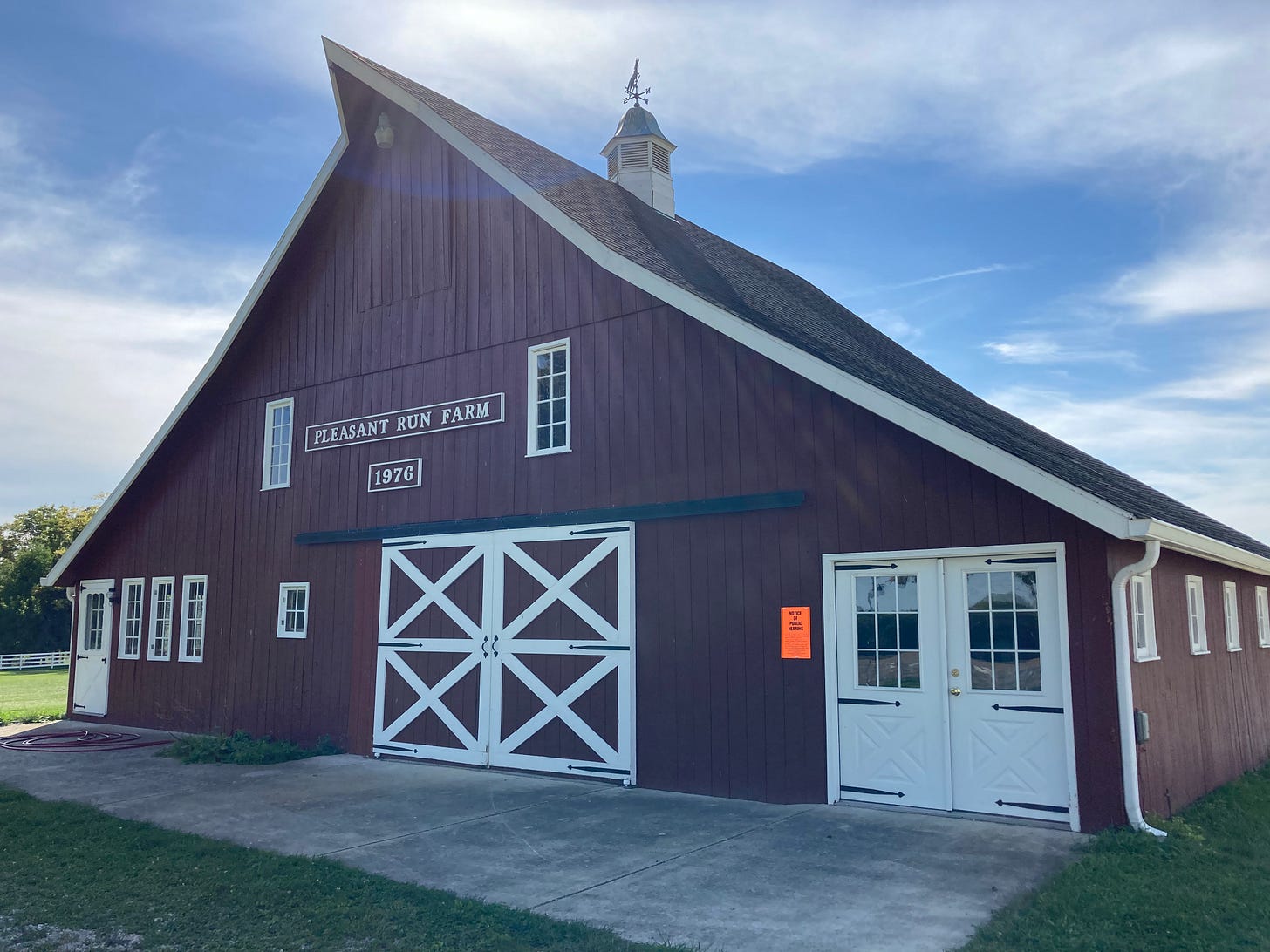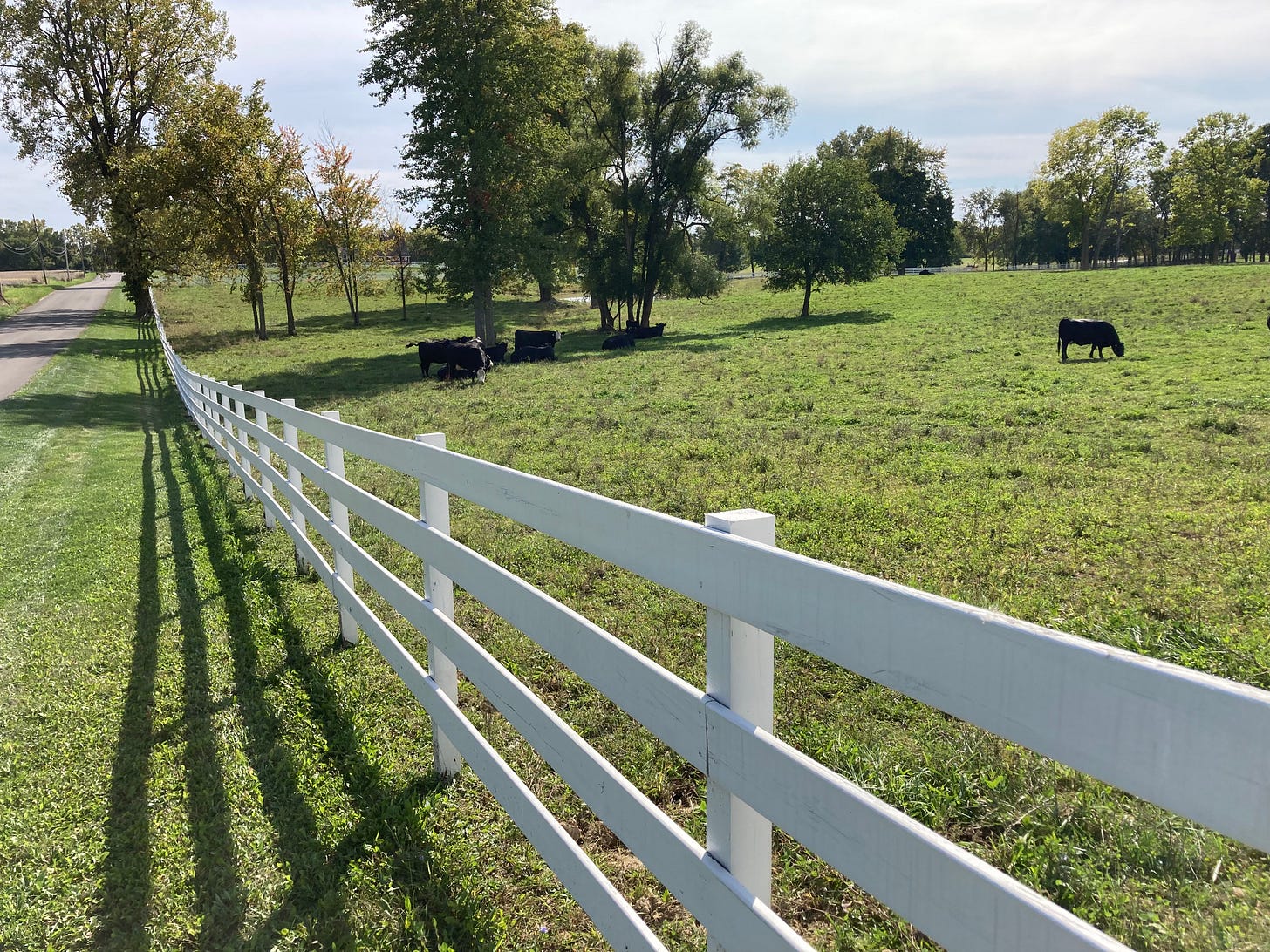Regenerative farming hub planned at I-69 and Ind. 332
Could the project rival Fair Oaks Farms as an agritourism destination?

YORKTOWN — A rezoning application has been filed to allow development of a regenerative farming, agritourism and renewable energy hub across 180 acres at Interstate 69 and Ind. 332.
The all-encompassing project would include the East Central Indiana Regenerative Farming Institute; a hotel/conference center and brewery; and a carbon-negative agriculture-technology hub to demonstrate growing crops between/beneath solar panels and raising livestock sustainably, according to the application.
“We're working hard to create an agritourism training component in Muncie and really highlight regenerative agriculture and renewable energy,” Jonathan Lamb, the applicant, told me. “Jason and I and two other partners are really looking to get as much community involvement as possible.”
Lamb, who ran for Congress against Greg Pence in the GOP primary election of 2018, is an economist, author and entrepreneur whose partners include Jason Mauck, a “mad scientist farmer,” podcaster and keynote speaker with more than 20,000 Twitter followers.
Last year, Lamb and Mauck acquired Munsee Meats, a longtime USDA-inspected meat plant in Muncie, where they launched an “Automated Farmers Market” that allows customers to retrieve orders from self-serve lockers.
Among other enterprises, Mauck is also the CEO and Lamb the CFO at Constant Canopy, a name that refers to a cropping system in which something is growing in the soil, even between rows, year round.
According to the application to rezone about 180 acres northeast of I-69 and Ind. 332 to limited industrial use:
The focus of the proposed development is to create a space that demonstrates real world sustainable practices for living and farming and does so in a backdrop of normal business and recreational activities. For example, the proposal calls for a hotel with an event venue, restaurant, welcome center with gift shop, a small market, brewery, and gathering place for community outreach.
However, what sets this development apart is the inclusion of livestock, for food and energy production, and agrivoltaic farming.
Agrivoltaic farming is a relatively new concept; in simplest terms, it takes solar panels and raises them off the ground to create an ideal growing environment for vegetables and other plants and reduce the need for as much water.
Rather than a field of panels with gravel underneath, you have panels with space in between and below that allows plants to get the right amount of sun, shade and light, with the bonus of leftover solar energy that can be used elsewhere in the sustainable living environment.
This project is designed for a zero waste out solution where byproducts of livestock and crop systems will be used for renewable energy production.
The proposed hub would also “demonstrate, train and issue certificates in sustainable, regenerative farming practices, renewable energy, and livestock management.”
The goals of regenerative farming include reversal of climate change; restoring degraded soil; increased biodiversity; erosion control; energy from waste, and reduction of pesticides. Practices include no till farming; vegetative buffer strips between fields and waterways; composting; cover crops to keep roots in the soil year round; crop rotation; providing habitat for pollinators; use of native plants, and diverse pastures.
With plans incorporating a welcome center, gift shop, playground, golf venue, amphitheater, hotel, conference center, brewery, fishing ponds, cabins and trails, the planned regenerative farming hub at I-69 and Ind. 332 sounds reminiscent, in size, of Fair Oaks Farms at I-65 on the opposite side of Indiana.
(“Recognized as the #1 agritourism destination in the Midwest,” Fair Oaks Farms is still recovering from the black eye it suffered two years ago after the activist group Animal Recovery Mission released undercover footage of animal abuse at the mega-dairy complex.
(Since then, the farm, whose attractions include the Dairy Adventure, the Pig Adventure, and the Crop Adventure, has publicly reported on its ongoing progress in “enhancing our commitment to animal welfare.”)
Lamb earned two degrees (economics and risk management/insurance) while also running the 400-meter hurdles at Ball State University in four years. He later earned an MBA from North Carolina State.
He has worked on a trading floor as a spot electricity trader; owned a construction company, a child-care franchise, a wholesale distribution company, a plumbing company and a textile company; started an agriculture technology company in Muncie called OptoeV (self-driving electric farm equipment); operated a consulting firm, LambONOMICS, where he authored a book, "Economics is Like Sex: Common Sense Thinking for Better Decisions Through the Taboo Topics of Money, Budgets, Markets and Trade;” and is current CFO of Constant Canopy and co-founder and CFO of Cardinal Green Energy LLC.
Mauck the maverick farmer earned a degree from Ball State in marketing, after which he sold insurance, worked as a home-improvement salesman and started a landscaping/mowing business before returning to the farm where he grew up in the Gaston area.
Successful Farming named him to its "10 Up & Comers in Agriculture" list in 2017 for his eagerness to research, innovate, collaborate and experiment with methods to keep his soil busy growing and interplanting crops.
Mauck has farm experience ranging from ag robots to bottomless chicken coops on wheels in which the domesticated fowl dig, weed, fertilize and control pests in the crop fields. One of his many experiments sought to break the Guinness World Record of 16 ears on one corn plant.
The Delaware-Muncie Metropolitan Plan Commission is scheduled to conduct a public hearing on the rezoning application at 6 p.m on Oct. 7.






